翻译培训 名词性从句的译法共37页文档
- 格式:ppt
- 大小:2.59 MB
- 文档页数:37
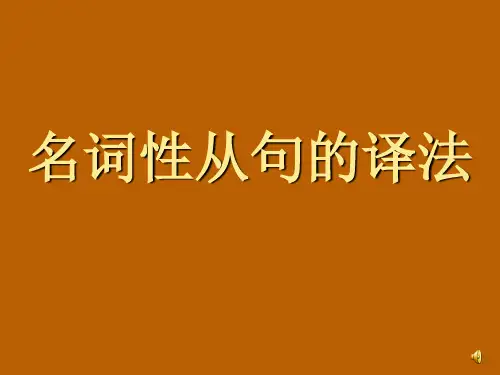
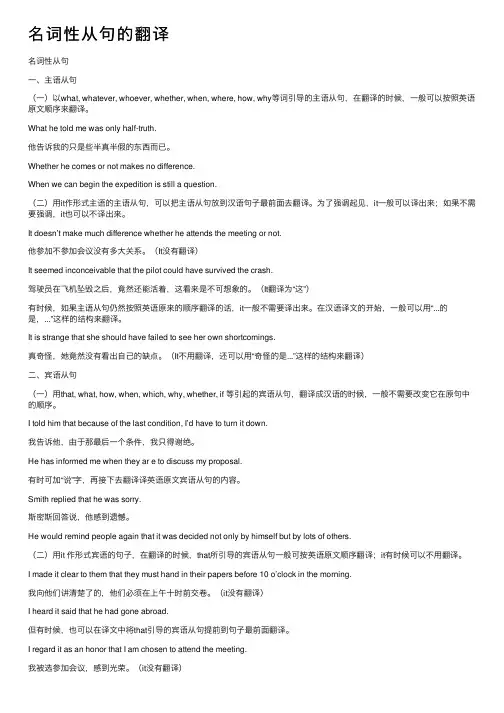
名词性从句的翻译名词性从句⼀、主语从句(⼀)以what, whatever, whoever, whether, when, where, how, why等词引导的主语从句,在翻译的时候,⼀般可以按照英语原⽂顺序来翻译。
What he told me was only half-truth.他告诉我的只是些半真半假的东西⽽已。
Whether he comes or not makes no difference.When we can begin the expedition is still a question.(⼆)⽤it作形式主语的主语从句,可以把主语从句放到汉语句⼦最前⾯去翻译。
为了强调起见,it⼀般可以译出来;如果不需要强调,it也可以不译出来。
It doesn’t make much difference whether he attends the meeting or not.他参加不参加会议没有多⼤关系。
(It没有翻译)It seemed inconceivable that the pilot could have survived the crash.驾驶员在飞机坠毁之后,竟然还能活着,这看来是不可想象的。
(It翻译为“这”)有时候,如果主语从句仍然按照英语原来的顺序翻译的话,it⼀般不需要译出来。
在汉语译⽂的开始,⼀般可以⽤“...的是,...”这样的结构来翻译。
It is strange that she should have failed to see her own shortcomings.真奇怪,她竟然没有看出⾃⼰的缺点。
(It不⽤翻译,还可以⽤“奇怪的是...”这样的结构来翻译)⼆、宾语从句(⼀)⽤that, what, how, when, which, why, whether, if 等引起的宾语从句,翻译成汉语的时候,⼀般不需要改变它在原句中的顺序。
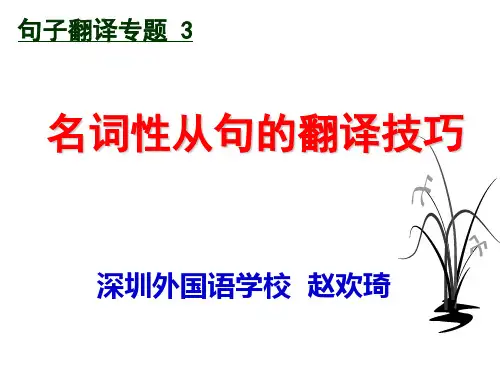
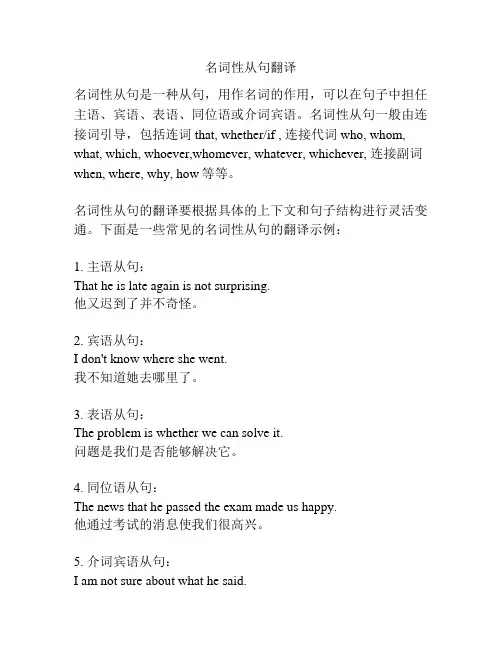
名词性从句翻译名词性从句是一种从句,用作名词的作用,可以在句子中担任主语、宾语、表语、同位语或介词宾语。
名词性从句一般由连接词引导,包括连词that, whether/if , 连接代词who, whom, what, which, whoever,whomever, whatever, whichever, 连接副词when, where, why, how等等。
名词性从句的翻译要根据具体的上下文和句子结构进行灵活变通。
下面是一些常见的名词性从句的翻译示例:1. 主语从句:That he is late again is not surprising.他又迟到了并不奇怪。
2. 宾语从句:I don't know where she went.我不知道她去哪里了。
3. 表语从句:The problem is whether we can solve it.问题是我们是否能够解决它。
4. 同位语从句:The news that he passed the exam made us happy.他通过考试的消息使我们很高兴。
5. 介词宾语从句:I am not sure about what he said.我不确定他说的是什么。
6. 间接引导名词性从句:He asked where I lived.他问我住在哪里。
7. 是否从句:I wonder whether/if she will come to the party.我想知道她是否会来参加派对。
8. 选择性从句:He asked me whether I preferred coffee or tea.他问我是喜欢咖啡还是茶。
9. 宾语从句(陈述句变为疑问句):Do you know what time it is?你知道现在几点钟吗?10. 宾语从句(连接代词):I wonder who is going to pick us up at the airport.我想知道谁会在机场接我们。
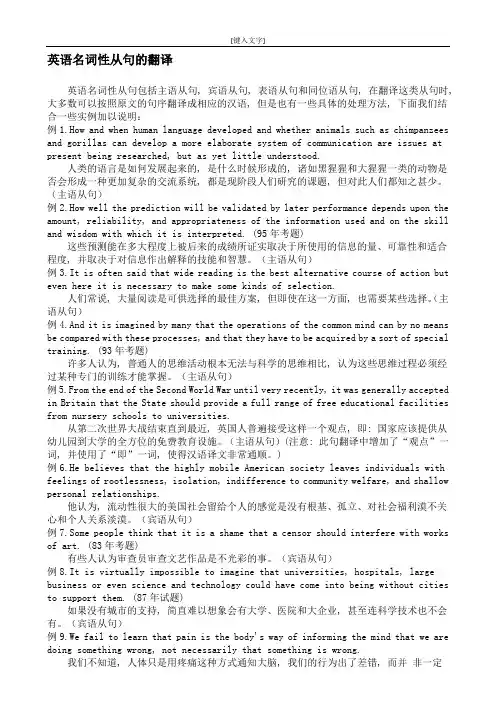
英语名词性从句的翻译英语名词性从句包括主语从句, 宾语从句, 表语从句和同位语从句, 在翻译这类从句时, 大多数可以按照原文的句序翻译成相应的汉语, 但是也有一些具体的处理方法, 下面我们结合一些实例加以说明:例1.How and when human language developed and whether animals such as chimpanzees and gorillas can develop a more elaborate system of communication are issues at present being researched, but as yet little understood.人类的语言是如何发展起来的, 是什么时候形成的, 诸如黑猩猩和大猩猩一类的动物是否会形成一种更加复杂的交流系统, 都是现阶段人们研究的课题, 但对此人们都知之甚少。
(主语从句)例2.How well the prediction will be validated by later performance depends upon the amount, reliability, and appropriateness of the information used and on the skill and wisdom with which it is interpreted. (95年考题)这些预测能在多大程度上被后来的成绩所证实取决于所使用的信息的量、可靠性和适合程度, 并取决于对信息作出解释的技能和智慧。
(主语从句)例3.It is often said that wide reading is the best alternative course of action but even here it is necessary to make some kinds of selection.人们常说, 大量阅读是可供选择的最佳方案, 但即使在这一方面, 也需要某些选择。

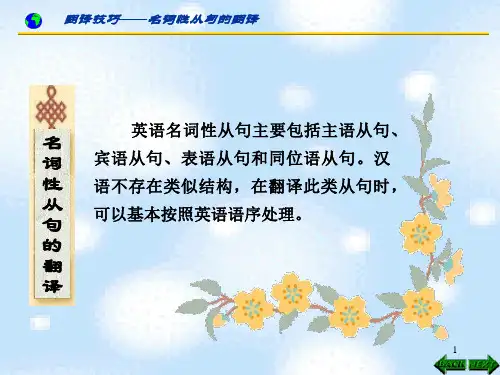
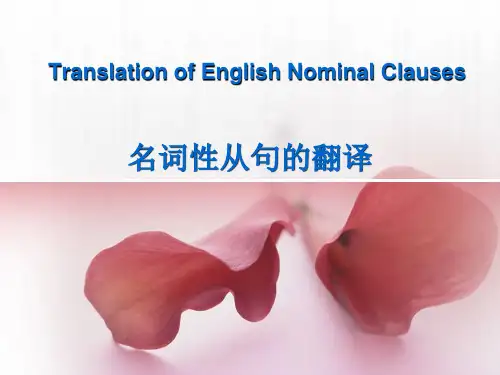
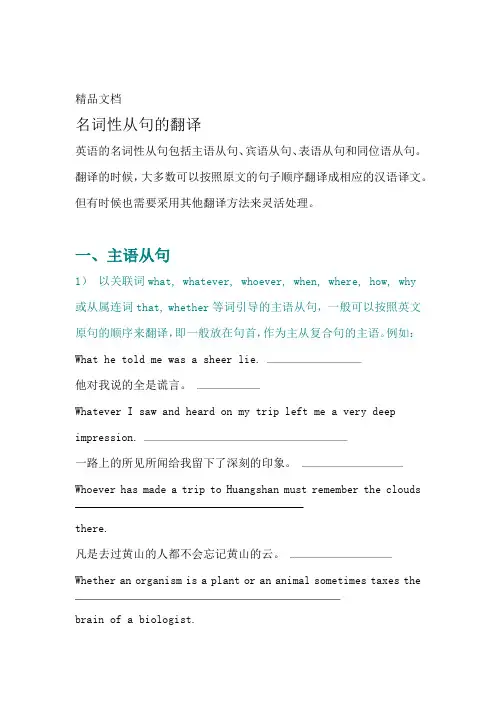
精品文档名词性从句的翻译英语的名词性从句包括主语从句、宾语从句、表语从句和同位语从句。
翻译的时候,大多数可以按照原文的句子顺序翻译成相应的汉语译文。
但有时候也需要采用其他翻译方法来灵活处理。
一、主语从句1)以关联词what, whatever, whoever, when, where, how, why或从属连词that, whether等词引导的主语从句,一般可以按照英文原句的顺序来翻译,即一般放在句首,作为主从复合句的主语。
例如:What he told me was a sheer lie.他对我说的全是谎言。
Whatever I saw and heard on my trip left me a very deep impression.一路上的所见所闻给我留下了深刻的印象。
Whoever has made a trip to Huangshan must remember the clouds there.凡是去过黄山的人都不会忘记黄山的云。
Whether an organism is a plant or an animal sometimes taxes the brain of a biologist.精品文档.精品文档一种生物究竟是植物还是动物,有时会让生物学家颇伤脑筋。
作形式主语的主语从句,可以先译主句,顺译为无人称句。
it2) 对于有时也可先译从句,再译主句,这样的话,一般需要在主句前加译如果不需要强调,可以将其译出;it,“这”。
需要注意的是,如果强调也可不译。
例如:It is strange that she should have failed to see her own shortcomings.真奇怪,她竟然看不出自己的缺点。
It seemed incredible that she should have lied to us.她居然对我们说谎,这真是不可思议。
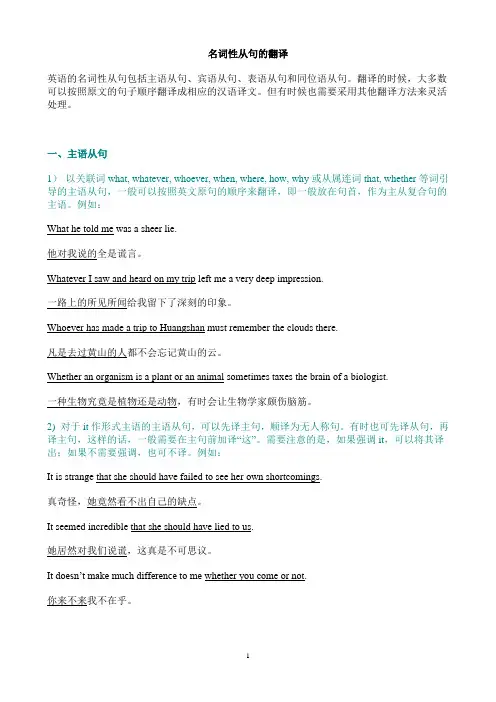
名词性从句的翻译英语的名词性从句包括主语从句、宾语从句、表语从句和同位语从句。
翻译的时候,大多数可以按照原文的句子顺序翻译成相应的汉语译文。
但有时候也需要采用其他翻译方法来灵活处理。
一、主语从句1)以关联词what, whatever, whoever, when, where, how, why或从属连词that, whether等词引导的主语从句,一般可以按照英文原句的顺序来翻译,即一般放在句首,作为主从复合句的主语。
例如:What he told me was a sheer lie.他对我说的全是谎言。
Whatever I saw and heard on my trip left me a very deep impression.一路上的所见所闻给我留下了深刻的印象。
Whoever has made a trip to Huangshan must remember the clouds there.凡是去过黄山的人都不会忘记黄山的云。
Whether an organism is a plant or an animal sometimes taxes the brain of a biologist.一种生物究竟是植物还是动物,有时会让生物学家颇伤脑筋。
2) 对于it作形式主语的主语从句,可以先译主句,顺译为无人称句。
有时也可先译从句,再译主句,这样的话,一般需要在主句前加译“这”。
需要注意的是,如果强调it,可以将其译出;如果不需要强调,也可不译。
例如:It is strange that she should have failed to see her own shortcomings.真奇怪,她竟然看不出自己的缺点。
It seemed incredible that she should have lied to us.她居然对我们说谎,这真是不可思议。
It doesn’t make much difference to me whether you come or not.你来不来我不在乎。

名词性从句的翻译名名词词性性从从句句的的翻翻译译英语名词从句包括主语从句、宾语从句、表语从句和同位语从句等。
翻译这类从句时,大多数可按原文的句序译成对应的汉语,但也还有一些其它的处理方法。
现分述如下:一、主语从句(一)以what, whatever, whoever 等代词引导的主语从句翻译时一般可按原文顺序翻译。
1) What he told me was only half-truth.他告诉我的只是些半真半假的东西。
2) Whatever he saw and heard on his trip gave him a very deep impression.他此行所见所闻都给他留下了深刻的印象。
3) Whoever has made a voyage up the Hudson must remember the Kaatskill Mountains.凡是在哈得孙河上游航行过的人是一定记得卡兹吉尔群山的。
他告诉我的只是些半真半假的东西而已。
(二)以it 作假主语所引出的真主语从句,翻译时视情况可以提前,也可以不提前。
1. 真主语从句提前译,为了强调起见,it 一般可以译出来,如果不需要强调,it 也可以不译出来。
1)It doesn’t m ake much difference whether he attends the meeting or not .他参加不参加会议没有多大关系。
2)It is a fact that the U .S .S .R .has sent it fleet to all parts of the world. 苏联已把它的舰队派往世界各地,这是事实。
3)It seemed inconceivable that the pilot could have survived the crash .驾驶员在飞机坠毁之后,竟然还能活畜,这看来是不可想象的。
2.真主语从句不提前,it 一般不需要译出来。
英语名词性从句的翻译英语名词性从句包括主语从句, 宾语从句, 表语从句和同位语从句, 在翻译这类从句时, 大多数可以按照原文的句序翻译成相应的汉语, 但是也有一些具体的处理方法, 下面我们结合一些实例加以说明:例1.How and when human language developed and whether animals such as chimpanzees and gorillas can develop a more elaborate system of communication are issues at present being researched, but as yet little understood.人类的语言是如何发展起来的, 是什么时候形成的, 诸如黑猩猩和大猩猩一类的动物是否会形成一种更加复杂的交流系统, 都是现阶段人们研究的课题, 但对此人们都知之甚少。
(主语从句)例2.How well the prediction will be validated by later performance depends upon the amount, reliability, and appropriateness of the information used and on the skill and wisdom with which it is interpreted. (95年考题)这些预测能在多大程度上被后来的成绩所证实取决于所使用的信息的量、可靠性和适合程度, 并取决于对信息作出解释的技能和智慧。
(主语从句)例3.It is often said that wide reading is the best alternative course of action but even here it is necessary to make some kinds of selection.人们常说, 大量阅读是可供选择的最佳方案, 但即使在这一方面, 也需要某些选择。
考研英语每日一课(英译汉——名词性从句的译法)英译汉——名词性从句的译法英语名词性从句包括主语从句,宾语从句, 表语从句和同位语从句, 在翻译这类从句时, 大多数可以按照原文的句序翻译成相应的汉语,但是也有一些具体的处理方法,下面我们结合一些实例加以说明:例1.How andwhenhuman lang uagedevel opedand w hethe r ani malssuchasch impan zeesand g orill as ca n dev elopa mor e ela borat e sys tem o f com munic ation areissue s atprese nt be ing r esear ched, butas ye t lit tle u nders tood.人类的语言是如何发展起来的, 是什么时候形成的, 诸如黑猩猩和大猩猩一类的动物是否会形成一种更加复杂的交流系统,都是现阶段人们研究的课题, 但对此人们都知之甚少。
(主语从句)例2.How w ell t he pr edict ion w ill b e val idate d bylater perf orman ce de pends upon theamoun t, re liabi lity, andappro priat eness of t he in forma tionusedand o n the skil l andwisd om wi th wh ich i t isinter prete d. (95年考题)这些预测能在多大程度上被后来的成绩所证实取决于所使用的信息的量、可靠性和适合程度,并取决于对信息作出解释的技能和智慧。
名词性从句译法They want to explain why we possess certain characteristic andexhibit certain behavior.【结构分析】本句种why引导的为宾语从句,可单独译为一句、【参考译文】他们想要说明,为什么我们有某些性格特征和表现出某些行为。
Those who support the "nature" side of the conflict believe that ourpersonalities and behavior are largely determined by biologicalfactors.【结构分析】本句中that从句作believe 的宾语,其中who引导的是定语从句,修饰those。
【参考译文】在这场争论中,赞成"天性"的那些人认为:我们的性格特征和行为模式大多是由生物因素所决定的。
That our environment has little, if anything, to do with ourabilities, characteristics and behavior is central to this theory.【结构分析】本句中that our…. And behavior是主语从句,在整个句中作主语。
可将从句译为"的"字结构,或译成主谓宾结构作句子的主语,其余部分仍按原文顺序译出。
【参考译文】这种理论的核心是,我们的环境同我们的才能、性格特征和行为,即使有什么联系的话,也是不足道的。
How well the prediction will be validated by later performancedepends upon the amount, reliability, and appropriateness of theinformation used and on the skill and wisdom with which it isinterpreted.【结构分析】How well the prediction will be validated by later performance是主语从句,在整个句中作主语:谓语是depends upon(on); 宾语有两个,它们分别是:the amount,reliability, and appropriateness of the information used 和the skilland wisdom。